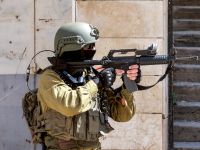The joint Israeli-Palestinian security committee meeting, which was to reconvene late Monday night, was called off Monday afternoon, at the Palestinians' request.
The Israel-Palestinian committee was to consider bridging proposals presented overnight by U.S. envoy Anthony Zinni in an attempt to overcome obstacles to a cease-fire agreement.
According to press reports, Israel is inclined to approve the latest American proposals.
A senior Israeli security source said Monday that, while Israel still has reservations about the plan, it will, in all likelihood, give its approval.
On Sunday, Zinni presented both sides with new proposals, addressing the main issues that still divide the parties. Chief among these is the impasse over a timetable for the steps leading up to a cease-fire, and the schedule for the implementation of the Tenet plan.
The two sides disagree on whether the Israeli pullback from the territories and lifting of blockades on Palestinian cities should take place before or after the Palestinians increase action taken to prevent attacks.
Israel has suggested that the original Tenet document be upheld for an entire month, while the Palestinians are suggesting a period of two weeks. Zinni is exerting pressure on Israel to compromise and accept the shorter time period.
Meanwhile, the United States pressed Israel to let Palestinian leader Yasser Arafat attend this week's Arab summit in Beirut regardless of whether a cease-fire is declared.
Israel’s Prime Minister Ariel Sharon was due to convene his extended security cabinet, or "kitchen cabinet" Monday to consider permitting Arafat attend the summit.
Israel's decision now hinges on two factors: the progress Zinni is able to make, and on whether there are further Palestinian attacks prior to the summit.
President George W. Bush asked Sharon on Monday to permit Arafat to go to Lebanon.
Bush, speaking through the White House spokesman, said he "would very much like to see come out of Beirut a recognition by Arab leaders that's consistent with Abdullah's initiative that recognizes Israel's right toe xist and secure borders."
"The president believes that Mr. Sharon and the Israeli government should give serious consideration to allowing Yasser Arafat to attend," spokesman Ari Fleischer said.
Russia also pushed Israel to let Arafat out of the West Bank. "We are in favour of Yasser Arafat's presence in Beirut," said Russian foreign ministry spokesman Alexander Yakovenko in Moscow. "It is important to hear his point of view," he said. (Albawaba.com)
© 2002 Al Bawaba (www.albawaba.com)







